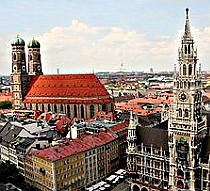
Networking Issues in Multimedia Entertainment
(NIME'12)
Munich, Germany, July 30, 2012
Co-Located with ICCCN 2012
Technically co-sponsored by the IEEE and IEEE Communications Society

|
8th International Workshop on
Networking Issues in Multimedia Entertainment (NIME'12) Munich, Germany, July 30, 2012 Co-Located with ICCCN 2012 Technically co-sponsored by the IEEE and IEEE Communications Society |
|
Home Call for Papers (PDF) (TXT) Paper Format/Submission Workshop Program Conference Venue Hotel Information Visa Information Main Conference Web Site 
|
Theme and ScopeThe growing availability of digital contents and the simultaneous cost reductions in storage, processing, and networking is driving the growth of the entertainment technology. While in the past entertainment technology traditionally offered predominantly passive experiences, continual advances in network and computer technologies are providing tools for implementing greater interactivity and for enabling consumers to enjoy more exciting experiences, such as, for example, interactive digital TV, interactive theatre and orchestrated music and sound design. This phenomenon is pulling together an extremely diverse group of experts specializing in different technical areas, such as networking, computer graphics, artificial intelligence, games, animation, multimedia design, human-computer interaction, educational media and software engineering. Even though high-tech entertainment promotes interdisciplinary fusion, yet only the ubiquity of wireless/wired communication is considered suitable for accepting the challenge of building a large interactive environment for the delivery of the maximum entertainment value to millions of consumers worldwide. In this respect, there is a great hope that the wired and wireless may take over this complex scenario for fulfilling the consumer expectations. The 8th International Workshop on Networking Issues in Multimedia Entertainment provides an open forum for researchers, engineers and academia to exchange the latest technical information and research findings on next-generation networked multimedia concepts, technologies, systems, and applications for entertainment covering existing deployments, current developments and future evolution. Authors are solicited to submit complete unpublished papers in the following, but not limited to, topic areas:Application for Entertainment
Paper SubmissionsWe encourage researchers from industry and academia to submit original works. Submitted manuscripts must be formatted in standard IEEE camera-ready format (double-column, 10-pt font) and must be submitted via EDAS ( https://edas.info/newPaper.php?c=12229 ) as PDF files (formatted for letter (8.5x11-inch) paper). The manuscripts should be no longer than 5 pages. One additional page is permitted if the authors are willing to pay an over-length charge at the time of publication (manuscripts should not exceed 6 pages). Submitted papers cannot have been previously published in or be under consideration for publication in another journal or conference. The workshop Program Committee reserves the right to not review papers that either exceed the length specification or have been submitted or published elsewhere. Submissions must include a title, abstract, keywords, author(s) and affiliation(s) with postal and e-mail address(es). A paper abstract must be registered on EDAS by the deadline.Submission format and instruction, as well as other important information, can be found on the ICCCN workshops web page (http://www.icccn.org/icccn12/workshops.html). Review and Publication of ManuscriptsSubmitted papers will be reviewed by the workshop Program Committee and judged on originality, technical correctness, relevance, and quality of presentation. An accepted paper must be presented at the ICCCN 2012 venue by one of the authors registered at the full registration rate. Each workshop registration covers up to two workshop papers by an author. Accepted and registered papers will be published in proceedings that will be available through IEEE Xplore. Papers that are not presented at the ICCCN 2012 venue by one of the registered co-authors will not appear in IEEE Xplore.The paper title and author name list/order cannot be changed during the final camera-ready submission. All authors of a paper must be registered in the right order via EDAS at the submission time and cannot be changed after the submission due time at EDAS. The final program will be generated from EDAS automatically. Important Dates
OrganizationGeneral Co-Chairs
|